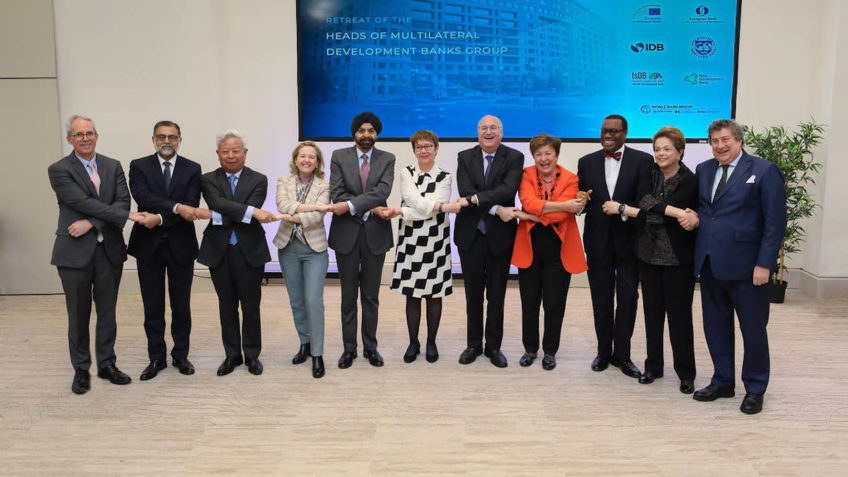Multilateral Development Banks deepen collaboration to work as a system
Developing a banking system is on the agenda of the G20 International Financial Architecture WG. The goal is to make institutions better, bigger and more agile in the face of the challenges of the global economy.

Today the leaders of ten Multilateral Development Banks (MDBs) announced joint measures to work more effectively as a system and increase the impact and scale of their work to address urgent development challenges. The measure is part of the priorities of the Brazilian presidency of the G20, discussed in the working group on International Financial Architecture, of the Finance Track.
In a note, the leaders outlined key outcomes for joint and coordinated action in 2024 and beyond, building on progress since the Marrakesh Declaration in 2023, as their institutions work to accelerate progress towards the Sustainable Development Goals (SDGs) and to better support clients in addressing regional and global challenges.
Published at the conclusion of a retreat organized by the Inter-American Development Bank (IDB), which holds the rotating presidency of the MDB Leaders Group, the actions listed represent the strengthening of collaboration between MDBs. The note will also serve as a valuable contribution to the next G20 Roadmap to transform the MDBs into a "better, bigger and more effective" system, as well as other forums.
Concrete and viable results in five critical areas:
1. Increase the MDBs' financing capacity. The MDBs hope to generate an additional margin for loans in the order of 300 billion to 400 billion dollars over the next decade, with the support of shareholders and partners. Actions include:
- Offer a diversified set of innovative financial instruments to shareholders, development partners and the capital market, including hybrid capital and risk transfer instruments, and promote the channeling of IMF Special Drawing Rights (SDRs) through MDBs.
- Provide more clarity on callable capital, which would help rating agencies better assess the value of callable capital.
- Continue to implement and report on the G20 Capital Adequacy Framework (CAF) Review recommendations and related reforms.
2. Boost joint action on climate change. The MDBs are increasing their joint involvement in the climate issue. Actions include:
- Present the first common approach to measuring climate adaptation and mitigation outcomes.
- Continue to align operations with the objectives of the Paris Agreement and present joint reports on climate finance, as well as participating in the UN-led process towards a new collective goal on climate finance.
- Continue to support and improve early warning systems for natural disasters.
3. Strengthen collaboration and co-financing at national level. MDBs are involved in discussions and supporting country-owned and country-led platforms to facilitate countries' work with banks. Actions include:
- Evaluate proposals on country-led and country-owned platforms towards a common understanding and next steps, including the implementation of platforms by some MDBs.
- Continue harmonizing procurement practices, including relying on each other's procurement policies to reduce transaction costs and increase efficiency and sustainability.
- Accelerate the co-financing of public sector projects with the recently launched Collaborative Co-financing Portal.
4. Catalyze private sector mobilization. MDBs are committed to increasing private sector financing for development objectives, notably by seeking innovative financial approaches and instruments. Actions include:
- Increase local currency lending and currency hedging solutions to boost private investment. MDBs are working to identify approaches with greater scale.
- Expand the type and disaggregation of statistics that MDBs and Development Finance Institutions (DFIs) disseminate via the Global Emerging Markets (GEM) Risk Database Consortium, supporting investors to better assess investment risks and opportunities.
5. Improve the effectiveness and impact of development. The MDBs agreed to increase their focus on the impact of their work. Actions include:
- Increase collaboration on joint impact assessments, notably with shared approaches to monitoring and evaluating impact, and pursue harmonization initiatives where useful.
- Take stock of the key performance indicators (KPIs) on nature and biodiversity that are currently in use and explore the feasibility of aligning some indicators ahead of COP30 in 2025.
For more details, see the Viewpoint Note.